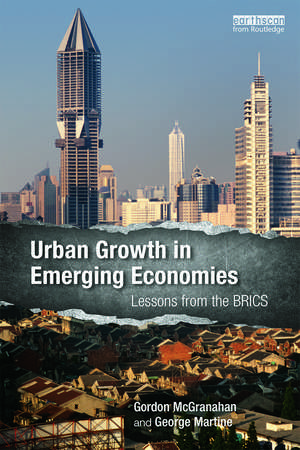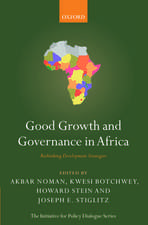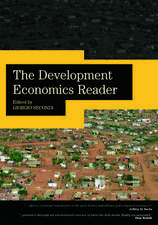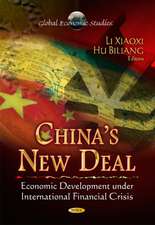Urban Growth in Emerging Economies: Lessons from the BRICS
Editat de Gordon McGranahan, George Martineen Limba Engleză Paperback – 23 apr 2014
This book is aimed at students and researchers in urban studies and development studies. It will also be of interest to policy advisors concerned with urbanization and the role of cities in a country’s development
| Toate formatele și edițiile | Preț | Express |
|---|---|---|
| Paperback (1) | 445.49 lei 6-8 săpt. | |
| Taylor & Francis – 23 apr 2014 | 445.49 lei 6-8 săpt. | |
| Hardback (1) | 996.04 lei 6-8 săpt. | |
| Taylor & Francis – 30 apr 2014 | 996.04 lei 6-8 săpt. |
Preț: 445.49 lei
Nou
Puncte Express: 668
Preț estimativ în valută:
85.32€ • 87.90$ • 71.47£
85.32€ • 87.90$ • 71.47£
Carte tipărită la comandă
Livrare economică 22 februarie-08 martie
Preluare comenzi: 021 569.72.76
Specificații
ISBN-13: 9780415718769
ISBN-10: 0415718767
Pagini: 288
Ilustrații: 29 black & white tables
Dimensiuni: 156 x 234 x 15 mm
Greutate: 0.44 kg
Ediția:New.
Editura: Taylor & Francis
Colecția Routledge
Locul publicării:Oxford, United Kingdom
ISBN-10: 0415718767
Pagini: 288
Ilustrații: 29 black & white tables
Dimensiuni: 156 x 234 x 15 mm
Greutate: 0.44 kg
Ediția:New.
Editura: Taylor & Francis
Colecția Routledge
Locul publicării:Oxford, United Kingdom
Public țintă
Postgraduate and UndergraduateCuprins
1. Urbanisation and development: Policy lessons from the BRICS experience 2. Brazil’s negligent urban transition and its legacy of divided cities 3. China’s radical urbanisation and bringing capital and labour together step by step 4. Russia’s planned urbanization and misplaced urban development 5. South Africa’s tortured urbanisation and the complications of reconstruction 6. India’s sluggish urbanisation and Its exclusionary development 7. Could a more positive approach to urbanization in the BRICS have facilitated both economic growth and social inclusion?
Recenzii
This book by internationally renowned scholars provides a rigorous overview of the urbanisation trajectories of the BRICS, and how these trajectories are shaping future prospects. It will not only assist the BRICS but also help other urbanising countries work out their urbanisation pathways, and to critically re-examine their own policies.
–Girija Vyas, Indian Minister of Housing and Urban Poverty Alleviation
Carefully avoiding urban boosterism, while making clear that that the power of emergent nations lies in their cities, the editors bring together well focussed and authoritative contributions to offer nuanced and comparative reflection on why and how the urban transitions taking place across the BRICS lie at the heart of contemporary global policy debates.
–Susan Parnell, University of Cape Town, South Africa
Despite the talk of rising cities, capitalist globalization is subordinating them and privileging investors over actual and aspiring citizens. Drawing on the experience of the BRICS, this book demonstrates how urban land is often the source of conflict, and that new approaches to urbanization are required to help achieve needed social and environmental reforms.
–Erminia Maricato, University of São Paulo, Brazil
–Girija Vyas, Indian Minister of Housing and Urban Poverty Alleviation
Carefully avoiding urban boosterism, while making clear that that the power of emergent nations lies in their cities, the editors bring together well focussed and authoritative contributions to offer nuanced and comparative reflection on why and how the urban transitions taking place across the BRICS lie at the heart of contemporary global policy debates.
–Susan Parnell, University of Cape Town, South Africa
Despite the talk of rising cities, capitalist globalization is subordinating them and privileging investors over actual and aspiring citizens. Drawing on the experience of the BRICS, this book demonstrates how urban land is often the source of conflict, and that new approaches to urbanization are required to help achieve needed social and environmental reforms.
–Erminia Maricato, University of São Paulo, Brazil
Descriere
This book examines the role of urbanization and urban growth in the emerging economies, taking the ‘BRICS’ countries (Brazil, Russia, India, China and South Africa) as case studies. It analyses how their different approaches towards urbanization have shaped their historical development paths and assisted or constrained their futures. Along with globalization, urban transitions have been central in the southward shift in economic power towards the newly emerging economies. As this book shows, however, these transitions have not been painless, and it is important for the rest of the urbanizing world to learn from the mistakes as well as the successes of the BRICS.













